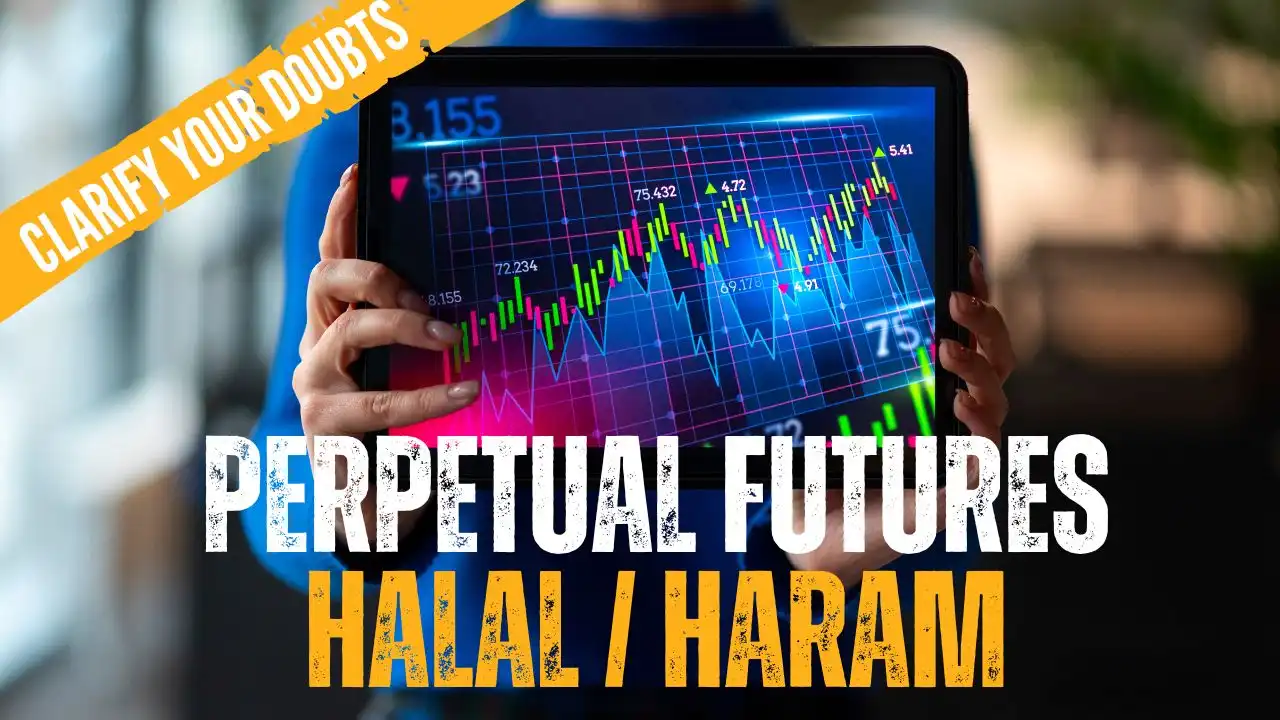A popular speculative trading instrument called perpetual futures contracts receives massive popularity especially among crypto traders today. The question “are perpetual futures halal or haram” appears special because multiple people seek answers regarding it.
Table of Contents
And it makes sense! The rise of perpetual futures has been dramatic, and the market is now worth trillions of dollars. With such a massive presence, it’s safe to say that many Muslims are actively trading in this market.
So, in this discussion, we’ll:
- Start with a quick refresher on what a futures contract is.
- The next section presents how perpetual futures contracts differ from other derivatives
- This discussion will provide the answer to whether perpetual futures contracts are permissible or not permissible according to Islamic law.
Let’s get started.
What is a Futures Contract?
A futures contract functions as a binding agreement which lets two parties determine the price and date of a future asset transaction.
For example, let’s say:
- You and I agree that one month from now, I will sell you 1 Bitcoin for $105,000.
- This means that on the settlement date, you are obligated to buy, and I am obligated to deliver that Bitcoin for the agreed price.
Contracts falling under the category of futures operate as binding agreements that establish prices for future deals.
What is a Perpetual Futures Contract?
The principle distinction of perpetual futures contracts becomes apparent at this point. Traditional futures differ from perpetual futures because they do not specify settlement moments for their transactions.
- You can hold your long or short position indefinitely.
- The contract’s price is designed to always stay in line with the underlying asset’s price.
Since there’s no fixed expiration date, traders can buy or sell at any time without worrying about a settlement period.
Now, you might be wondering…
Traders choose perpetual futures trading instead of direct cryptocurrency purchasing because of multiple benefits but why?
Great question! Market participants trade perpetual futures because of three specific reasons.
Why Trade Perpetual Futures Instead of Direct Crypto Trading?
Traders prefer perpetual futures over direct crypto trading because they offer leverage, the ability to short-sell, and no expiry dates, allowing for more flexible and strategic market participation.
1. You Can Profit in Both Market Directions
Traditionally buying crypto leads to profits through price increases yet perpetual futures provide both long position and short position functionalities for earning money through price changes.
2. Lower Trading Fees & Higher Liquidity
Futures trading maintains lower fees which spot trading does not.
Trading through perpetual futures provides traders with faster market entry and exit so positions can be handled more easily.
3. Leverage: Control a Large Position with a Small Investment
Trading allows you to borrow funds to amplify your trade size.
The trading system enables you to increase your investment power by accessing borrowed funds.
For example, Binance (one of the largest crypto exchanges) allows traders to leverage their positions up to 125x what they deposit.
This means if you put down $100, you can control a position worth $12,500—but with great risk.
What are funding fees in Perpetual Contracts
Funding fees are periodic payments exchanged between traders in perpetual futures contracts.
- Unlike traditional futures, perpetual contracts have no expiration date, which means they require a mechanism to keep the contract price aligned with the spot market.
- This is achieved through funding fees, where traders in long positions pay traders in short positions when the funding rate is positive, and vice versa when it is negative.
- These payments occur at set intervals (e.g., every eight hours on Binance), ensuring that the contract price does not deviate significantly from the underlying asset’s market value.
- While this mechanism serves a technical purpose in the crypto market.
Sounds attractive, right? But here’s where we get to the most important part…
Are Perpetual Futures Contracts Halal or Haram?
There are several major concerns with perpetual futures contracts from an Islamic perspective. Let’s break them down.

1. Cash-Settled, No Real Asset Exchange
One of the biggest issues is that no actual asset is being exchanged.
- When a perpetual futures contract is settled, you’re not receiving Bitcoin, Ethereum, or any real asset.
- Instead, you’re just exchanging money based on whether you won or lost the price bet.
This makes it a zero-sum game—where one trader’s gain is another trader’s loss—which leads us to the next issue.
2. It Resembles Gambling (Maisir) – Which is Prohibited
In Islam, gambling (Maisir) is clearly forbidden.
Allah (SWT) says in the Qur’an:
“O you who believe! Intoxicants, gambling, sacrificing for idols, and making decisions based on games of chance are filth from the work of Satan. So avoid these things so you may prosper.”
(Surah Al-Ma’idah 5:90-91)
- Perpetual futures contracts are based on speculation, where traders bet on price movements.
- Since no actual asset is being traded and it’s purely a money game, it aligns with the definition of gambling—which makes it haram.
3. Exchanges May Have a Conflict of Interest
Here’s something that many casual traders don’t realize…

- Remember how futures trading always has two sides?
- Sometimes, the other party in your futures contract isn’t another trader—it’s the exchange itself!
Now, think about this:
- The exchange sets the price.
- The exchange also takes the opposite side of your trade in many cases.
Wouldn’t that be like competing in a match where your opponent also gets to decide the rules and the final score?
This raises serious concerns about price manipulation.
For example, have you ever noticed sudden price spikes or drops that happen in just a few seconds—then quickly recover?
- These are called “stop hunts” or “liquidation wicks”.
- They wipe out leveraged positions, causing traders to lose their money instantly.
- And whether or not the exchange does this intentionally is something you’ll never know.
That’s why trading perpetual futures is extremely risky, and in many cases, the odds are stacked against retail traders.
4. Islamic View on Funding Fees and what is overnight interest rate
In Islamic finance, riba is any guaranteed, time-based financial gain that does not involve real economic activity or risk-sharing. The Qur’an explicitly forbids riba, stating:
“But Allah has permitted trade and has forbidden interest.”
(Surah Al-Baqarah 2:275)
Funding fees function similarly to interest, as traders either receive or pay a fee based on how long they hold a position. This resembles riba al-nasi’ah, where an increase in debt or capital is charged over time without any exchange of tangible goods.
The Prophet Muhammad (PBUH) also strongly condemned interest-based transactions, saying:
“The worst sin after associating partners with Allah is indulging in riba.”
(Sunan Al-Nasa’i, Hadith 5437, Graded Sahih)
Because funding fees result in financial gain or loss without an actual trade of goods or services, they contradict the Islamic principle of fair trade and risk-sharing, making them impermissible.
It introduces a financial structure that bears similarities to riba (interest), which is strictly prohibited in Islam.
FAQs
Is Trading Futures Halal or Haram?
Trading futures could be haram depending on the contract terms. If it involves elements like borrowing with interest or excessive speculation, it is considered haram in Islam. Traders must ensure they avoid these elements to make it halal.
Is Binance Futures Trading Halal or Haram?
Binance futures trading may be haram due to the presence of interest and leverage, which are often used in such contracts. If these elements are present, the trading would violate Islamic principles. However, some alternative platforms offer trading solutions compliant with Islamic guidelines.
What is the Overnight Interest Rate?
The overnight interest rate refers to the rate charged for borrowing money overnight. In trading, it is associated with margin trading, where interest is paid or received for holding a position overnight. In Islam, this practice is considered haram due to the involvement of riba (interest).
What are Funding Fees?
Funding fees are the costs paid by traders who hold positions overnight in perpetual futures contracts. These fees are often based on the difference between the spot price and the futures price and can include interest-like charges. In Islamic finance, this is considered riba and thus haram, as it involves earning or paying interest.
Final Thoughts
So, based on all these factors, I personally find perpetual futures contracts to be haram for the following reasons:
They are cash-settled—no real asset is exchanged.
They meet the definition of gambling (Maisir)—which Islam strictly prohibits.
There’s a high risk of price manipulation, making it unfair and exploitative.
At the end of the day, Islamic finance promotes fair and ethical trade—where value is created through real economic activity, not speculation.
So, if you’re a Muslim trader, it’s important to reconsider engaging in perpetual contracts.
Instead, consider Shariah-compliant alternatives, such as:
- Spot trading (buying actual crypto assets)
- Profit-sharing investments (Mudaraba, Musharaka)
- Islamic-compliant financial instruments
Closing Notes
I hope this discussion helped clarify the Islamic perspective on perpetual futures contracts.

If you found this useful:
Leave a comment to support the content.
Subscribe to stay updated with more in-depth discussions.
Consider sharing the article through social media platforms to access more insights—including my crypto portfolio updates.
Until next time, take care and stay informed.

